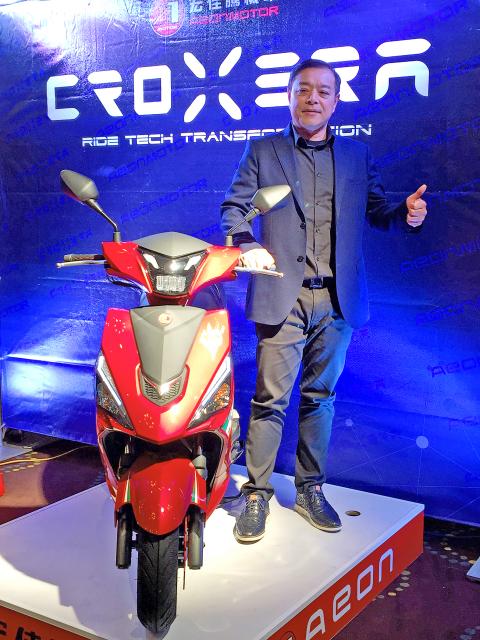Motorcycle vendor Aeon Motor Co (宏佳騰) expects its business in the second half of the year to outperform that in the first half as orders for all-terrain vehicles (ATVs) grow and its first electric scooter enters the market this summer.
“Orders for our ATVs are expected to rise every quarter, thanks to higher demand from US clients, including Polaris Industries Inc and Yamaha Motor Corp USA,” a public relations official, who asked to remain anonymous, told the Taipei Times by telephone.
Given robust ATV sales this year, Aeon reported a 37.12 percent increase in revenue for the first five months to NT$1.08 billion (US$34.84 million), compared with NT$786.02 million a year earlier.

Photo: Yang Ya-min, Taipei Times
“We also expect motorcycle shipments to surpass 100,000 units this year, bolstered by sales of AI-1 electric scooters and gasoline-powered Dory 115 scooters,” he said.
The AI-1 electric scooter, which is scheduled to enter the market this summer, is a collaboration with Gogoro Inc (睿能創意) and uses Gogoro’s battery swapping system, the official said.
The AI-1’s smart dashboard provides riders with audio road guidance, as well as alarms for speed limits and calls, the company said.
The official declined to give more details about the AI-1, including its price tag.
The prices of similar electric scooters, such as the Yamaha EC-05 and Gogoro S2 series, are close to NT$100,000, according to the companies’ Web sites.
Aeon entered the Chinese market late last year and is planning to produce heavy motorcycles at its Chinese unit this or next quarter, the company said.
The company held its annual general meeting on Thursday last week in Tainan, where shareholders approved the company’s plan to distribute a cash dividend of NT$1 per common share and a stock dividend of 0.2 percent.
The cash dividend represents a payout ratio of 27.86 percent based on last year’s earnings per share of NT$3.59 and implies a dividend yield of 2.25 percent based on the stock’s closing price of NT$44.50 yesterday.

Taiwan Semiconductor Manufacturing Co (TSMC, 台積電) founder Morris Chang (張忠謀) yesterday said that Intel Corp would find itself in the same predicament as it did four years ago if its board does not come up with a core business strategy. Chang made the remarks in response to reporters’ questions about the ailing US chipmaker, once an archrival of TSMC, during a news conference in Taipei for the launch of the second volume of his autobiography. Intel unexpectedly announced the immediate retirement of former chief executive officer Pat Gelsinger last week, ending his nearly four-year tenure and ending his attempts to revive the

WORLD DOMINATION: TSMC’s lead over second-placed Samsung has grown as the latter faces increased Chinese competition and the end of clients’ product life cycles Taiwan Semiconductor Manufacturing Co (TSMC, 台積電) retained the No. 1 title in the global pure-play wafer foundry business in the third quarter of this year, seeing its market share growing to 64.9 percent to leave South Korea’s Samsung Electronics Co, the No. 2 supplier, further behind, Taipei-based TrendForce Corp (集邦科技) said in a report. TSMC posted US$23.53 billion in sales in the July-September period, up 13.0 percent from a quarter earlier, which boosted its market share to 64.9 percent, up from 62.3 percent in the second quarter, the report issued on Monday last week showed. TSMC benefited from the debut of flagship

A former ASML Holding NV employee is facing a lawsuit in the Netherlands over suspected theft of trade secrets, Dutch public broadcaster NOS said, in the latest breach of the maker of advanced chip-manufacturing equipment. The 43-year-old Russian engineer, who is suspected of stealing documents such as microchip manuals from ASML, is expected to appear at a court in Rotterdam today, NOS reported on Friday. He is accused of multiple violations of the sanctions legislation and has been given a 20-year entry ban by the Dutch government, the report said. The Dutch company makes machines needed to produce high-end chips that power

Taiwan would remain in the same international network for carrying out cross-border payments and would not be marginalized on the world stage, despite jostling among international powers, central bank Governor Yang Chin-long (楊金龍) said yesterday. Yang made the remarks during a speech at an annual event organized by Financial Information Service Co (財金資訊), which oversees Taiwan’s banking, payment and settlement systems. “The US dollar will remain the world’s major cross-border payment tool, given its high liquidity, legality and safe-haven status,” Yang said. Russia is pushing for a new cross-border payment system and highlighted the issue during a BRICS summit in October. The existing system